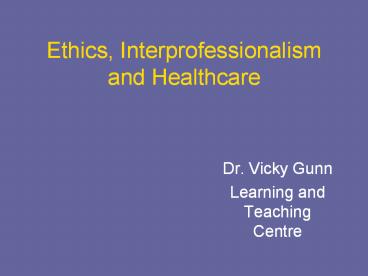Ethics, Interprofessionalism and Healthcare - PowerPoint PPT Presentation
Title:
Ethics, Interprofessionalism and Healthcare
Description:
Ethics, Interprofessionalism and Healthcare. Dr. Vicky Gunn. Learning and Teaching Centre ... benefits for patient care and safety than multiprofessionalism... – PowerPoint PPT presentation
Number of Views:93
Avg rating:3.0/5.0
Title: Ethics, Interprofessionalism and Healthcare
1
Ethics, Interprofessionalism and Healthcare
- Dr. Vicky Gunn
- Learning and Teaching Centre
2
- Why is interprofessionalism an ethics issue?
Where does it fit within an ethics framework? - Is interprofessionalism a response to increasing
complexity (in terms of specialization) and the
consequential awareness that this has an impact
on healthcare outcomes? - Psycho-dynamics as a way of mediating complexity?
3
Why is interprofessionalism an ethics issue?
Where does it fit within an ethics framework?
4
- Does ethics require us to reflect on what and how
we give value to one form of experience/knowledge
over another? - Does ethics encourage us to reflect on practice
when the evidence suggests the possibility of
achieving better healthcare outcomes?
5
- a growing body of evidence suggests
interprofessionalism offers greater benefits for
patient care and safety than multiprofessionalism
- (Bleakley, et al., 2006, p. 467)
6
- Interprofessional relationships continue to be
characterized by conflict rather than
co-operation.. - (Irvine, et al, 2002, p.199)
7
Is interprofessionalism a response to increasing
complexity (in terms of specialization) and the
consequential awareness that this complexity has
an impact on healthcare outcomes?
8
Irvine et als Useful Framework (2002)
- Professional divisions
- Authority and the division of labour
- Subverting medical dominance
- Professional organization
- Different value systems (cf Irvine, et al, 2004)
- Legal effects
9
- Rather than promoting more egalitarian and
collaborative social formations, healthcare teams
tend to reflect, reproduce and perpetuate the
traditional divisions of labour, status systems
and systems of authority. - (Irvine, et al., 2002, p. 204)
10
Irvine et al continued
- Cultural barriers
- Intellectual baggage
- Language (eg in shock)
- Intra-professional variation
- Identity
- Training
11
Psycho-dynamics as a way of understanding the
complex relational interprofessional issues
12
Lets try this assumption
- When we list apparent obstacles to
interprofessionalism, we are just embodying
inter-group emotionality and psychodynamics
within a reason-based framework. The actual
behaviours and attitudes expressed are far less
reason-based
13
(No Transcript)
14
Optional inter-group responses to conflict (or,
how do groups respond to one another?)
15
(No Transcript)
16
Is IPE responding to a question of how are
professionals and interprofessionals created?
ie exploration of the socialization processes.
17
Bourdieus Habitus
- the coercive power of covert educational
practice to reproduce the dominant values and
beliefs of professional fields












![[PDF] The Clinician's Guide to Treating Cleft Palate Speech 2nd Edition Kindle PowerPoint PPT Presentation](https://s3.amazonaws.com/images.powershow.com/10105946.th0.jpg?_=20240823055)



![[Download ]⚡️PDF✔️ Medical-Surgical Nursing: Concepts for Clinical Judgment and PowerPoint PPT Presentation](https://s3.amazonaws.com/images.powershow.com/10128553.th0.jpg?_=20240911121)














